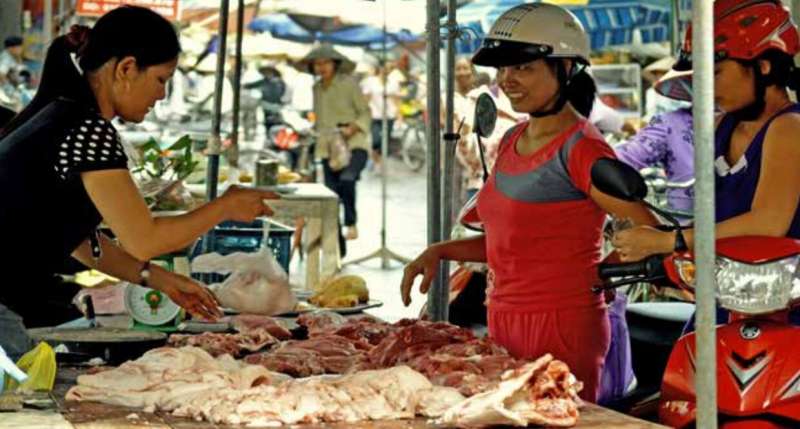This article has been reviewed according to Science X's editorial process and policies. Editors have highlighted the following attributes while ensuring the content's credibility:
fact-checked
proofread
Comprehensive new report tackles food safety risks in the informal sector of developing countries

A report commissioned by the International Livestock Research Institute (ILRI) and the CGIAR Initiative on One Health highlights the urgent need for innovative strategies to address food safety risks in the informal sector of developing countries. The report "New Directions for Tackling Food Safety Risks in the Informal Sector of Developing Countries" sheds light on the dominant role of small-scale processors, grocers, market vendors, and food service operators in informal markets in more than 20 low- and lower middle-income countries' food systems and emphasizes that a wholesale shift is needed to operationalize safer food in the informal sector.
Despite ongoing structural changes, the prevalence of small-scale food businesses remains prominent in the food systems of most developing countries. These informal players play a crucial role in the domestic markets for high-nutrient foods such as fish, meat, fruits, and vegetables.
"Previous studies have shown widespread issues of food contamination within informal food distribution networks," said Steven Jaffee, one of the co-authors of the report and lecturer in the Department of Agricultural and Resource Economics at the University of Maryland. Factors contributing to this problem include inadequate food safety awareness, poor hygiene practices, substandard food storage and preparation methods, and deficient infrastructure and environmental conditions.
Regrettably, very few countries have coherent strategies in place to address food safety risks in the informal sector and surveys have shown low levels of food safety among workers in that sector.
Current approaches often focus on disrupting small-scale operators in an attempt to replace them with a vision of a "modern" food system.
"Over the past two decades, ILRI has been working with national and local authorities to create an enabling environment, providing training and appropriate technologies to value chain actors, and most importantly, assuring incentives are in place for better practice by food producers, handlers and consumers," says Hung Nguyen, co-leader of the Animal and Human Health Program at ILRI.
Most existing policies and resources aimed at domestic food safety in developing countries concentrate on strengthening centralized systems for "food control." While investments have been made in testing laboratories, food company inspection units, and national agency capacities, these efforts primarily focus on medium and larger food enterprises within the formal sector. Insufficient attention has been given to informal food operators and businesses, resulting in a missed opportunity to improve food safety in this crucial sector.
"It is clear that doing more of the same will not yield safer food in the informal sector", says Spencer Henson, a professor in the Department of Food, Agricultural and Resource Economics at the University of Guelph, Canada, and a co-author of the report. "Nothing less than a paradigm shift is required to effectively address food safety risks moving forward".
The report recommends the following key approaches:
- Local action, centrally guided: Interventions, both regulatory and facilitative, should primarily be implemented at the municipal level. National agencies can play a pivotal role in mobilizing resources, providing guidelines, and offering technical support. Multistakeholder platforms, involving consumers, communities, business associations, and government bodies, should be strengthened and utilized to drive the agenda for safer food in the informal sector.
- Multisectoral action: Enhancing the safety of food in the informal sector should be integrated with interventions focused on nutrition improvement, access to clean water and sanitation, environmental management, and urban infrastructure upgrades. Mainstreaming food safety into urban planning and municipal service delivery is essential.
- Rebalancing the use of sticks and carrots: Rather than strictly enforcing regulatory provisions, a gradual and continuous improvement approach should be pursued. Informal market operators should be engaged and enabled to strengthen their incentives and capacities to provide safer food. Cities and local ministries should consider employing food hygiene and business advisors to support operators instead of relying solely on regulatory inspections.
- Differentiating local strategies and priorities: A tailored approach is necessary since a "one size fits all" solution is impractical. The risk profile and potential for interventions vary among different types of informal food operators and within countries. The decentralized and multisectoral approach should be pragmatically adapted to specific circumstances, with a focus on effective coalitions for action and the sequencing or integration of interventions.
The report highlights several examples of existing initiatives offering valuable insights into the successful application of decentralized and multisectoral approaches.
By adopting innovative and inclusive strategies to tackle food safety risks in the informal sector, developing countries can enhance public health, promote sustainable urban development, and uplift the livelihoods of millions of informal food operators.
"The challenge now is to convince funders and implementers to take these successful and affordable approaches to scale" says Hung Nguyen.
More information: Report: cgspace.cgiar.org/bitstream/ha … f_122.pdf?sequence=1
Provided by International Livestock Research Institute





















